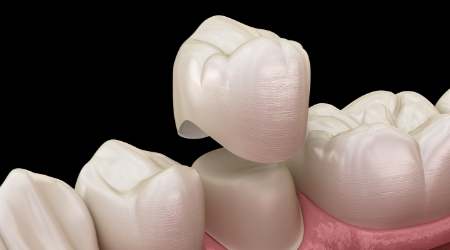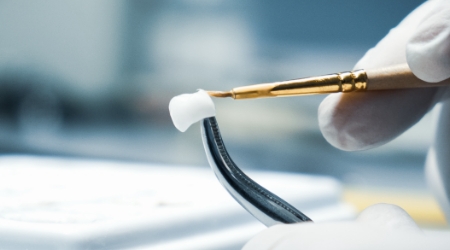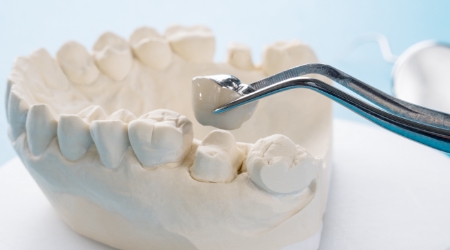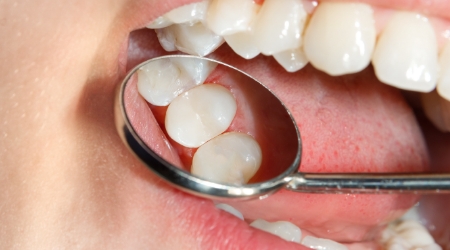Dental Crowns Eugene
Preserve & Protect Your Natural Smile
Your teeth perform some essential tasks every day. They are incredibly strong and able to withstand a significant amount of daily use. Despite their incredible strength, the teeth can still be affected by physical damage and decay, which can lead to cracks, chips, cavities, and more. This damage can compromise the strength of the affected teeth as well as their health. At College Hill Dental, we can restore your damaged tooth with a dental crown in Eugene. Just give us a call to schedule an appointment!
Why Choose College Hill Dental for Dental Crowns?
- We Accept & Maximize Dental Insurance
- High-Quality, Durable Dental Materials Used
- Affordable In-House Membership Plan Available
What Are Dental Crowns?

When faced with tooth damage, it is essential to get treatment right away, even if the damage does not seem all that serious at the time. More significant damage can compromise the strength of the tooth and leave it susceptible to developing an infection. In these cases, our team at College Hill Dental may recommend a dental crown.
These small, cap-like restorations are designed to fit over the visible surface of a tooth to seal it off, protecting it from harmful oral bacteria, and strengthen its structure. Oftentimes, our patients who opt to restore their natural teeth with dental crowns are able to avoid tooth extraction and continue using their natural tooth for decades to come!
What are Dental Crowns Made Of?

A dental crown can be made from one of several different materials. These include:
- Metal. A metal dental crown is the strongest type of crown available. It is practically indestructible and can last 50 years or longer with proper care. Despite its incredible strength, metal crowns are silver or gold in color. They stand out quite prominently against the rest of your teeth, making it obvious.
- Porcelain fused to metal. Porcelain fused to metal, or PFM, dental crowns combine the strength of metal with the aesthetics of porcelain. The crown has a metal base that surrounds your tooth. A porcelain coating helps to provide a more natural appearance. In some cases, the metal can be seen through the porcelain, rendering them more noticeable.
- Ceramic. Ceramic dental crowns are the most aesthetically pleasing option available. They are made entirely from ceramic, a material that can be stained to perfectly match the color of your natural teeth. It also reflects light just like natural tooth enamel. It may not be as strong as metal, but it can still withstand most normal daily use.
The Process of Getting a Dental Crown

Getting a dental crown typically takes two appointments. During the first appointment, we’ll prepare the tooth under a local anesthetic, which ensures that you feel no discomfort. Preparation involves removing a portion of your enamel to make the tooth smaller. This is necessary to ensure that your crown will fit comfortably and naturally alongside the rest of your teeth.
After the tooth has been prepared, we take an impression of your mouth. The impression is sent to our dental lab, where your custom crown is designed and created. This process can take up to two weeks, so a temporary crown is placed while you wait to protect your prepared tooth.
At your second appointment, after your custom dental crown has been sent back, we check the restoration for fit and bite. If everything looks and feels good, the dental crown is cemented into place on your tooth.
The Benefits of Getting a Dental Crown

There are several benefits associated with getting a dental crown. These benefits include
- Prevention of further damage.
- Protection against infection.
- Restoring strength and allowing the tooth to function normally.
- Preventing the need for a tooth extraction.
Dental crowns also work to anchor a fixed bridge in place, replace missing teeth with dental Implants, and provide additional protection following a root canal.
Understanding the Cost of Dental Crowns

There are a number of different factors that can play into the cost of getting a dental crown, ranging from the material you choose to have it crafted from to whether or not you require a preparatory procedure, like root canal treatment, beforehand. Our team will provide you with a detailed cost estimate before scheduling your procedure to make sure you understand any out-of-pocket costs associated with the visit. We’ll also make sure to maximize your insurance benefits along every step of the way!
Factors That Affect the Cost of Dental Crowns

There are multiple details that come into play when it comes to determining the cost of your dental crown, including:
- The severity of damage to your tooth and what treatments may be required before the dental crown can be seated on the tooth, like a root canal or tooth-colored filling.
- The material that you opt to have your customized crown crafted from. Typically, metal crowns are less costly than tooth-colored ceramic or porcelain.
- Whether the dental crown will be used to replace a missing tooth, requiring it to be attached to a dental implant.
All of these details will be determined once our team has had an opportunity to examine your mouth. We’ll then present you with a treatment plan so you understand what restoring the health of your tooth will entail.
Does Dental Insurance Cover Dental Crowns?

At College Hill Dental, we’re proud to be in-network with a number of major dental insurance plans, including Delta Dental, BlueCross BlueShield, United Healthcare, and more. This means that we’ll maximize your benefits by filing claims on your behalf, whether you’re in- or out-of-network with our practice. We’re also happy to conduct a benefits check before your procedure so you have a clear idea of what your dental insurance company will cover of your treatment. In most cases, dental insurance will cover about 50 percent of the overall cost of the procedure.
Options to Make Dental Crowns More Affordable

Whether you’re uninsured or underinsured, our team offers other ways you can pay to make your treatment more accessible. We partner with third-party financiers like Cherry and CareCredit to offer our patients an option to split the cost of their procedures into low monthly payments at little-to-no interest. You can find out whether you qualify within moments by filling out their application online or in our office. For our uninsured patients, we also have an affordable in-house membership plan that includes a 15% discount on all dental treatments you need outside of the included preventive services.
Dental Crowns FAQs
Are Dental Crowns Permanent?
While dental crowns are not technically permanent, they are certainly a long-term solution since they can last between five and fifteen years on average if they receive excellent care. However, the process of placing a dental crown is irreversible since it involves removing a small amount of enamel that will not grow back, so teeth that receive them will have to wear them for protection from injury and infection from then on. However, dental crowns are usually used to repair teeth that have been damaged by trauma or decay, which can help them last much longer than they would otherwise. The best ways to keep your crowns in excellent condition are to practice excellent oral hygiene, enjoy regular checkups and cleanings at our office, wear a mouthguard when necessary, and limit your consumption of sugary and acidic foods and beverages.
How Long Do Dental Crowns Last?
Dental crowns usually last between five and fifteen years if they receive proper care, but their lifespan can be affected by the material they are made from. Metal crowns may last slightly longer than ceramic ones, but the difference is often negligible. Since crowns placed on molars endure more chewing pressure, they may not last as long as those placed on the front teeth. The most important factor in how long your crown can last is how well you care for it with your oral hygiene regimen and dietary decisions. Bad habits like smoking, excessive alcohol consumption, and using your teeth to open packages or bottles can significantly reduce the longevity of your restorative appliances.
How Do You Know When a Dental Crown Needs to Be Replaced?
Only a qualified dentist such as Dr. Paskalev can determine if your crown is ready to be replaced, but there are a few signs that your device is nearing the end of its lifespan you may notice at home. These include:
- Pain: Discomfort may be a sign of decay beneath the crown, which usually means the appliance must be removed so the infection can be treated.
- Instability: A crown that is wiggling around on its tooth is at increased risk of being lost.
- Degraded appearance: If your crown is marred by chips, cracks, or stains, you may need to replace it to maintain a pleasing appearance.
- A dark line: Old porcelain-fused-to-metal crowns can show dark lines around their bases due to age. We’ll be happy to replace these outdated models with beautiful and functional metal-free restorations.
Do Dental Crowns Get Cavities?
While it’s impossible for dental crowns to be infected, the teeth wearing them can be compromised by decay, and uncrowned pearly whites are just as likely to develop cavities as uncrowned ones. Fortunately, you can prevent this problem by consistently brushing and flossing every day, attending regular checkups at our office, and making smart eating decisions that limit your intake of sugars, acids, and starches.





